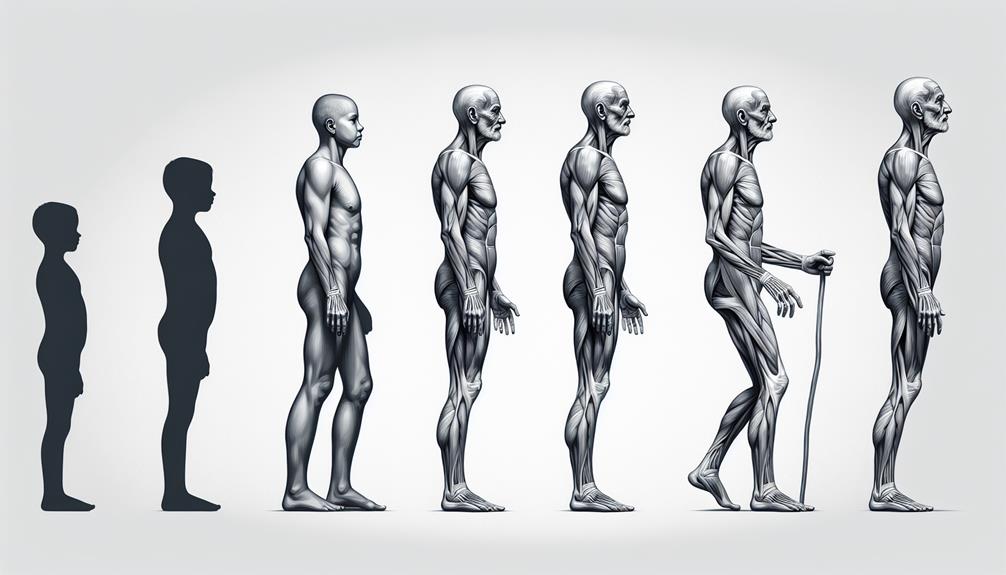
As you age, memory loss, changes in brain structure, and reduced blood flow can impact cognitive health. To maintain cognitive abilities, engage in brain-stimulating activities. Aging affects cardiovascular health by causing arterial stiffness, increased blood pressure, and decreased heart efficiency. Support your heart health with regular exercise and routine check-ups. For bone health, do weight-bearing exercises, ensure calcium intake, and avoid smoking. Conditions like osteoporosis can weaken bones, so prioritize bone density screenings. Hormonal shifts and cellular changes influence metabolic function. Support your metabolism with a healthy diet, exercise, and proper medical care. Aging affects the immune system, so prioritize good hygiene and understanding autoimmune responses. Take care of your emotional well-being by acknowledging emotions, practicing self-care, and seeking therapy if needed. Strong emotional well-being impacts physical abilities, so implement strategies for mobility and balance. Strategies such as fall prevention, strength training, and physical therapy can help maintain mobility.
Key Takeaways
- Memory loss from changes in brain structure.
- Cardiovascular health decline due to aging.
- Bone density reduction leading to osteoporosis.
- Metabolic function changes affecting energy levels.
- Weakened immune system increasing infection risk.
Cognitive Decline
As we age, cognitive decline can gradually impact our memory, reasoning, and decision-making abilities. One of the most noticeable changes is memory loss, which can manifest as forgetfulness, difficulty recalling information, and struggles with learning new things. This decline in memory function is often linked to changes in brain structure and function, including alterations in the hippocampus, a region crucial for memory consolidation.
Research suggests that as we age, certain brain functions may decline due to factors such as reduced blood flow to the brain, inflammation, and the accumulation of toxins. These changes can affect cognitive abilities like attention, processing speed, and executive function.
It's important to note that while some degree of cognitive decline is a natural part of aging, engaging in activities that stimulate the brain, maintaining a healthy lifestyle, and seeking medical advice if significant changes are noticed can help preserve cognitive function and overall brain health.
Cardiovascular Changes
Aging can bring about significant changes in your cardiovascular system, impacting the health and function of your heart and blood vessels. As you age, your blood vessels may experience increased arterial stiffness, leading to potential elevation in blood pressure. This change can put extra strain on your heart, affecting its function over time. Your heart's efficiency in pumping blood and maintaining circulation may also decrease with age, potentially impacting the delivery of oxygen and nutrients to various parts of your body.
Maintaining a healthy lifestyle becomes crucial in mitigating these cardiovascular changes. Regular exercise, a balanced diet, and managing stress can all play vital roles in supporting your heart health as you age. Routine check-ups with healthcare providers to monitor blood pressure, cholesterol levels, and overall heart function are essential for early detection and intervention if needed.

Bone Health
To maintain optimal bone health as you age, incorporating weight-bearing exercises into your routine is essential. Weight-bearing activities like walking, jogging, dancing, or using resistance bands help stimulate bone formation and strength. Alongside exercise, ensuring an adequate intake of calcium is crucial for bone health. Calcium absorption tends to decrease with age, making it important to include calcium-rich foods like dairy products, leafy greens, and fortified foods in your diet.
Osteoporosis prevention is a key focus when considering bone health in aging individuals. This condition weakens bones, making them more prone to fractures. In addition to exercise and calcium intake, avoiding smoking and excessive alcohol consumption can help prevent osteoporosis. Regular bone density screenings can also aid in early detection and treatment if necessary.
Metabolic Function
Maintaining a healthy metabolic function plays a vital role in overall well-being, especially as you focus on bolstering your bone health in the aging process. As you age, hormonal shifts and cellular changes can impact your energy metabolism and lead to conditions like insulin resistance. Hormones such as estrogen and testosterone, which decline with age, play crucial roles in regulating metabolism. Additionally, cellular changes can affect how efficiently your body converts food into energy, influencing overall metabolic health.
| Factors | Description | Importance |
|---|---|---|
| Hormonal Shifts | Changes in hormone levels can affect metabolism and lead to alterations in energy regulation. | Hormones are key in metabolic processes. |
| Cellular Changes | Aging can cause cellular damage, impacting the body's ability to metabolize nutrients effectively. | Cellular health is vital for metabolism. |
| Energy Metabolism | The process by which the body converts food into energy for various bodily functions. | Proper energy metabolism is essential. |
Understanding how hormonal shifts and cellular changes influence energy metabolism can help you make informed decisions to support your metabolic function as you age. Prioritizing a healthy diet, regular exercise, and proper medical care can aid in maintaining optimal metabolic health.
Immune System
Understanding how your immune system functions as you age is crucial for maintaining optimal health and well-being. As you grow older, certain changes occur in your immune system that can impact how well your body defends against infections and regulates inflammation. Here's what you need to know:
- Inflammation Regulation: With age, your immune system may not regulate inflammation as effectively, leading to chronic low-grade inflammation, which is linked to various age-related diseases.
- Infection Defense: Aging can weaken your immune response, making you more susceptible to infections. It's essential to maintain good hygiene practices and stay up to date with vaccinations to protect yourself.
- Autoimmune Responses: As you age, the risk of developing autoimmune conditions increases. Your immune system may start attacking healthy cells, leading to conditions like rheumatoid arthritis or lupus. Understanding these responses can help in managing such conditions effectively and seeking timely medical intervention.
Vision and Hearing
As you age, the health of your vision and hearing becomes increasingly significant, impacting your overall well-being and quality of life. Vision loss and hearing impairment are common issues among older adults. Regular eye exams are crucial in detecting conditions like age-related macular degeneration and cataracts early on. If you experience vision difficulties, consult an eye specialist for proper management and potential treatment options.

Similarly, hearing loss can affect your daily communication and social interactions. Hearing aids are valuable devices that can assist in amplifying sounds and improving your ability to engage with others. It's essential to address hearing problems promptly to prevent further deterioration. Regular screenings can help monitor changes in your hearing health.
Maintaining good vision and hearing is vital for your independence and safety as you age. Embracing assistive technologies like hearing aids and seeking professional guidance for vision issues can significantly enhance your quality of life. Remember, taking proactive steps to address these sensory changes can make a positive difference in how you navigate the world around you.
Emotional Well-being
Are you aware of the impact emotional well-being has on your overall health as you age? As you grow older, nurturing your emotional well-being is crucial for maintaining a healthy and fulfilling life. Here are some key factors to consider:
- Mental Resilience: Building mental resilience becomes increasingly important as you age. Coping with life's challenges, such as loss of loved ones or health issues, can become more difficult. Developing strategies to manage stress, practicing mindfulness, and seeking support from mental health professionals can enhance your mental resilience and emotional well-being.
- Social Connections: Maintaining strong social connections is vital for emotional well-being as you age. Engaging with friends, family, and community groups can provide a sense of belonging, reduce feelings of isolation, and offer support during tough times. Cultivating these relationships can positively impact your mental health and overall well-being.
- Emotional Regulation: As you age, it's essential to focus on emotional regulation. Acknowledging and processing your emotions, practicing self-care activities, and seeking therapy if needed can help you navigate the ups and downs of life with greater ease, contributing to a healthier emotional state.
Mobility and Balance
Nurturing your emotional well-being as you age also plays a significant role in maintaining your mobility and balance. Ensuring a strong emotional state can positively impact your physical abilities, including your balance and mobility. However, there are also specific strategies and interventions you can implement to enhance your mobility and balance as you age.
One key aspect of maintaining mobility and balance is fall prevention. Engaging in strength training exercises can help improve muscle tone and balance, reducing the risk of falls. Additionally, physical therapy can be beneficial in addressing any mobility issues and enhancing overall balance. Utilizing assistive devices like canes or walkers can provide added support and stability, further reducing the risk of falls.
To illustrate further, consider the following table:

| Strategy | Benefit |
|---|---|
| Fall Prevention | Reduces the risk of falls and related injuries |
| Strength Training | Improves muscle tone and overall balance |
| Assistive Devices | Provides added support and stability |
Conclusion
As you age, your body undergoes numerous changes that can impact your health in various ways. From cognitive decline to cardiovascular changes, bone health, and beyond, it's important to stay proactive in managing these shifts.
Remember, aging is like a rollercoaster ride – full of twists and turns. By staying informed, taking care of yourself, and seeking support when needed, you can navigate the ups and downs of aging with grace and resilience.
Stay strong, stay curious, and stay healthy.



